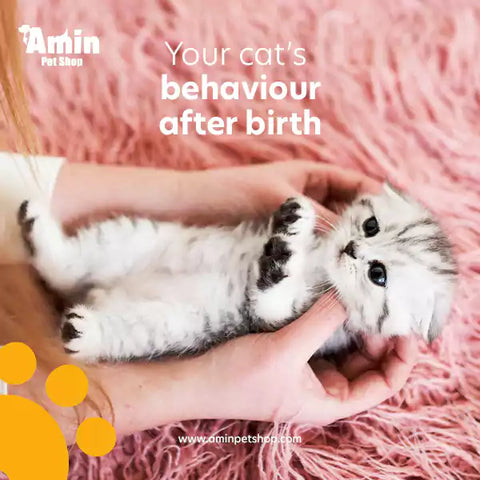How Soon Can You Neuter A Cat after Giving Birth? A question worth discovering. Although we all know it doesn't always work out, you may have heard that getting your cat spayed when it is a kitten is the best course of action. Young cats might get pregnant earlier than their owners anticipate. Alternatively, you may adopt a stray cat only to find out later that she is already pregnant. It is still advantageous to have as soon as possible, to get your cat spayed. after giving birth, regardless of how it turns out.
How soon can you neuter a cat after giving birth?
Let’s know how soon can you neuter a cat after giving birth? Having your female cat neutered can assist in preventing some health issues and ensure that she doesn't produce any unwanted litter.
You may decide that you don't want your cat to have any more kittens after she gives birth. Once her kittens are completely weaned, around eight weeks after giving birth, you can have her neutered.
However, your veterinarian should be consulted for advice about your cat's situation. She can't fully recuperate from surgery until now since she needs to spend a lot of time caring for her kitten.
Recall that your cat may be neutered as early as four months old, preventing them from producing a litter of kittens at such a young age.
My cat has just given birth, what do I do now?
It's crucial to monitor your cat and her kittens closely after she gives birth to make sure they're all doing well. You may ask yourself how soon can a mother cat get pregnant after giving birth? In this case, Try to stay as far away from your cat as possible so she can get used to being a mother. Your cat will naturally supply her babies with all they require.
Following the birth of your cat, you must:
- Keep the space she shares with her kittens cozy.
- Ensure that their bedding is maintained dry and clean.
- Make sure the room is peaceful and don't let family members bother her repeatedly.
- Make sure the kittens are eating by keeping a watchful eye on them, but try to stay as far away as your cat feels comfortable.
- Keep your cat and her kittens away from other pets.
- Verify that the kittens are eating; this should occur fairly immediately.
- Just after birth. After 30 minutes, if they still haven't begun, gently assist them.
- Contact your veterinarian for advice if you're feeling anxious at all.
Rarely, your cat may find it difficult to raise her babies. You might need to discuss hand-rearing them with your veterinarian if they are not eating adequately.
Read More: Kitten Separation Anxiety Symptoms
Your cat’s behaviour after birth

Mothering their babies comes easy to most cats. Perhaps you've noticed your cat:
- Caressing and stroking her little kitties with her tongue.
- transferring her kittens. She may decide to relocate her babies if she feels insecure for any reason or if the location she is in isn't warm enough for her. Instead of trying to stop her from doing this, try to provide her with a warm, cozy, and peaceful place to move.
- acting in a distinct way toward you. She might prefer that you keep your distance from her at first since cats are very protective of their babies.
Your cat's behavior may somewhat change after giving birth, but it will return to normal in a few weeks.
- Call your veterinarian if there are instances when your cat's behavior raises concerns. Here are a few things to watch out for and things you can do to support your cat and her kittens:
- A strong disturbance, persistent disruptions, or agony might drive a queen to murder her young. If mom is in excellent condition, the surroundings are tranquil, and she is familiar with her surroundings, the chance of this is lower. If a mother is caring for extremely young kittens, keep your cool and don't disturb her unless essential.
- Applying some of the birthing fluids on a kitten may encourage the queen to accept it if the kitten appears to be ignored or rejected.
How soon can you neuter a cat after giving birth? Time for Vet
How soon can you neuter a cat after giving birth? However, when is it too soon? The majority of veterinarians advise against spaying your cat until five or six weeks after the animal is born.
This allows the mother time to heal and allows your kittens to become less dependent on her. But, female cats become fertile very soon after giving birth, so you should keep her away from male cats who are still whole for the time being, just in case.
Does Spaying Hurt My Cat?
- Your cat may experience discomfort for 5-7 days post-surgery, making comfort a priority. It's challenging to detect pain in cats since they often hide their symptoms. Yet, your vet can prescribe effective pain relief during recovery.
- Do not halt the prescribed medications without your vet's approval, as neglecting post-operative care can worsen conditions like pain and inflammation, leading to issues such as the cat irritating the surgical site.
- Human medications are dangerous for cats, potentially fatal, and should never be administered. Consult your vet for safe pain management options.
- Spaying is usually a "sterile procedure," so antibiotics are not commonly given afterward. However, antibiotics may be necessary if your cat bleeds significantly, is older, or is in heat at the time of surgery.
- If prescribed, ensure your cat completes the antibiotic course even if she seems to improve. This prevents recurrence and combats antibiotic resistance, safeguarding your Cat's health.
What should I feed my cat after she has given birth?
It is advisable to provide your cat with high-quality kitten food when she is feeding her young. This will ensure that she is receiving enough nutrients to support their growth and development and facilitate the weaning process when the time comes.
Read More: How many times to feed a kitten milk?
Do mother cats reject their kittens if humans touch them?

It's important to treat kittens carefully even if their mothers won't necessarily leave them if they are touched by humans. Kittens are delicate creatures. If handled incorrectly, their sensitive bodies are quickly harmed.
It's important to always remember to support their head and neck, particularly when carrying or lifting them. Additionally, to prevent spreading any bacteria or diseases to the kittens you handle, always wash your hands before and after handling them.
Make sure the kittens are examined by a veterinarian as soon as possible if you intend to provide long-term care for them to guarantee their health.
How soon after birth can my cat go outside again?
She may withdraw from you or act in an unusually hostile manner toward you or other animals. She will need at least 24 hours to recuperate from a smooth labor and at least a week if there were issues, so it is not a good idea to allow her out just soon. Moreover, a cat that has not had neutered surgery might get pregnant again in as little as two weeks.
Read More: Rare Facts About Cats
How quickly can cats get pregnant after giving birth?
She will be let back outside after the kittens are a bit more self-sufficient. Though it may be preferable to attempt until the kittens are at least eight weeks old and ready to go to new homes, keep her inside, an unneutered female may conceive again as soon as two weeks after giving birth, if her litter is kept under her care.
Conclusion
How Soon Can You Neuter A Cat after Giving Birth? Overall, spaying your cat is the best course of action. She will be healthier and happier as a result, and as there are currently too many unwanted adult cats in the world, it will stop additional kittens from being produced. But you will have to wait a little while longer if your cat is pregnant or has recently given birth. Enjoy the adorable kittens in the meanwhile, and remember to spay them when the time comes.

